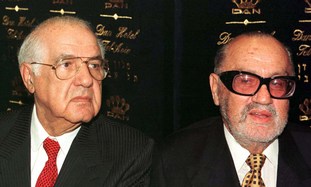Reuters reports:
Western security agencies were most likely behind the killing of an Iranian scientist in an operation that underlines the myriad complications in the conflict over Iran’s nuclear program, analysts say.
Darioush Rezaie, 35, a university lecturer, was shot dead by gunmen in eastern Tehran Saturday, the third murder of a scientist since 2009. One was killed in a car bomb, the second by a device detonated remotely.
The Iranian government’s responses to past such incidents have appeared confused but the Rezaie case has surpassed previous levels, with the authorities speaking in strikingly different voices from the outset.
“Assassinations will continue to be a tool used in this covert war. While it’s impossible to tell with certainty whether Rezaie was an active nuclear scientist, his death appears to be another episode in that war,” said London-based analyst Ghanem Nuseibeh, founder of Cornerstone Global Associates.
“The Iranian narrative has been confused about Rezaie’s work and this adds credence to the speculation that he has been involved in the nuclear program.”
When news of the shooting first came out, semi-official news agency Mehr published information on Rezaie’s background which indicated involvement in Iranian nuclear activities that have brought international sanctions on the Tehran government.
But the report was then immediately withdrawn by Mehr and Iran’s intelligence minister Heydar Moslehi and other officials denied Rezaie had any links to the nuclear energy program.
The New York Times reported last week:
Eight months after he narrowly survived an assassination attempt on the streets of Tehran, Fereydoon Abbasi, the nuclear physicist whom Iran’s mullahs have put in charge of the country’s Atomic Energy Organization, is presiding over what intelligence officials in several countries describe as an unexpected quickening of Iran’s production of nuclear material.
The selection of Dr. Abbasi earlier this year was itself a clear message to the West. As a university scientist, he was barred from traveling outside Iran by the United Nations Security Council because of evidence that his main focus was on how to build nuclear weapons, rather than power plants. But in recent weeks he has publicly declared that his country is preparing to triple its production of a type of nuclear fuel that moves it far closer to the ability to produce bomb-grade material in a hurry.
Filtering out the hyperbole surrounding recent proclamations about Iran’s tangible progress is always difficult, especially at a time when the country is determined to show that neither the Stuxnet computer worm, which crippled part of its nuclear infrastructure last year, nor Western sanctions have proved to be more than modest setbacks. Dr. Abbasi himself is rarely seen or heard outside of Iran.
But international nuclear inspectors and American officials say that all the evidence points to the imminent installation of centrifuges at an underground nuclear plant on a military base near the city of Qum. Iran revealed the existence of the plant in 2009, after learning that the United States and European powers were about to announce that they had discovered the complex, deep inside the Iranian base.

 The Ofer Brothers Group may be scurrying into damage control in Israel, Singapore, London and Washington, after the United States blacklisted it for trading with Iran, but Israel seems to be doing nothing to enforce international sanctions on Iran.
The Ofer Brothers Group may be scurrying into damage control in Israel, Singapore, London and Washington, after the United States blacklisted it for trading with Iran, but Israel seems to be doing nothing to enforce international sanctions on Iran.